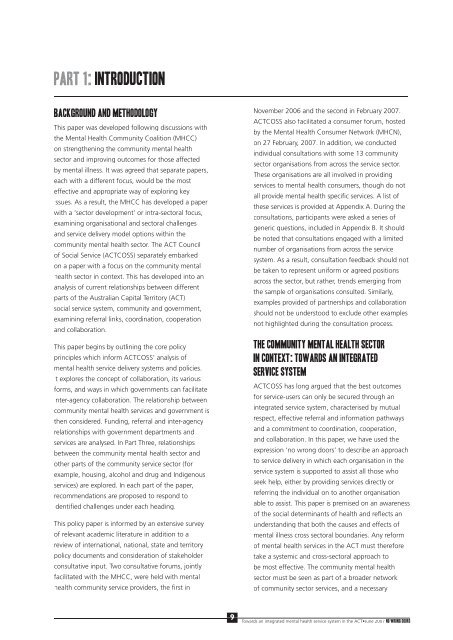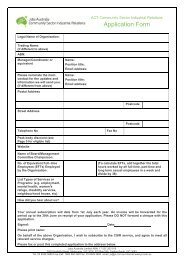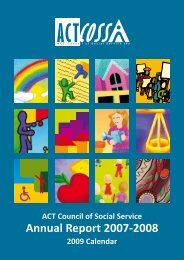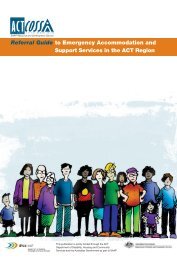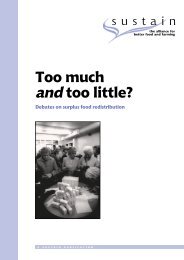actcoss text final.indd - ACT Council of Social Service
actcoss text final.indd - ACT Council of Social Service
actcoss text final.indd - ACT Council of Social Service
Create successful ePaper yourself
Turn your PDF publications into a flip-book with our unique Google optimized e-Paper software.
part 1: introduction<br />
BACKGROUND AND METHODOLOGY<br />
This paper was developed following discussions with<br />
the Mental Health Community Coalition (MHCC)<br />
on strengthening the community mental health<br />
sector and improving outcomes for those affected<br />
by mental illness. It was agreed that separate papers,<br />
each with a different focus, would be the most<br />
effective and appropriate way <strong>of</strong> exploring key<br />
issues. As a result, the MHCC has developed a paper<br />
with a ‘sector development’ or intra-sectoral focus,<br />
examining organisational and sectoral challenges<br />
and service delivery model options within the<br />
community mental health sector. The <strong>ACT</strong> <strong>Council</strong><br />
<strong>of</strong> <strong>Social</strong> <strong>Service</strong> (<strong>ACT</strong>COSS) separately embarked<br />
on a paper with a focus on the community mental<br />
health sector in con<strong>text</strong>. This has developed into an<br />
analysis <strong>of</strong> current relationships between different<br />
parts <strong>of</strong> the Australian Capital Territory (<strong>ACT</strong>)<br />
social service system, community and government,<br />
examining referral links, coordination, cooperation<br />
and collaboration.<br />
This paper begins by outlining the core policy<br />
principles which inform <strong>ACT</strong>COSS’ analysis <strong>of</strong><br />
mental health service delivery systems and policies.<br />
It explores the concept <strong>of</strong> collaboration, its various<br />
forms, and ways in which governments can facilitate<br />
inter-agency collaboration. The relationship between<br />
community mental health services and government is<br />
then considered. Funding, referral and inter-agency<br />
relationships with government departments and<br />
services are analysed. In Part Three, relationships<br />
between the community mental health sector and<br />
other parts <strong>of</strong> the community service sector (for<br />
example, housing, alcohol and drug and Indigenous<br />
services) are explored. In each part <strong>of</strong> the paper,<br />
recommendations are proposed to respond to<br />
identified challenges under each heading.<br />
This policy paper is informed by an extensive survey<br />
<strong>of</strong> relevant academic literature in addition to a<br />
review <strong>of</strong> international, national, state and territory<br />
policy documents and consideration <strong>of</strong> stakeholder<br />
consultative input. Two consultative forums, jointly<br />
facilitated with the MHCC, were held with mental<br />
health community service providers, the first in<br />
November 2006 and the second in February 2007.<br />
<strong>ACT</strong>COSS also facilitated a consumer forum, hosted<br />
by the Mental Health Consumer Network (MHCN),<br />
on 27 February, 2007. In addition, we conducted<br />
individual consultations with some 13 community<br />
sector organisations from across the service sector.<br />
These organisations are all involved in providing<br />
services to mental health consumers, though do not<br />
all provide mental health specific services. A list <strong>of</strong><br />
these services is provided at Appendix A. During the<br />
consultations, participants were asked a series <strong>of</strong><br />
generic questions, included in Appendix B. It should<br />
be noted that consultations engaged with a limited<br />
number <strong>of</strong> organisations from across the service<br />
system. As a result, consultation feedback should not<br />
be taken to represent uniform or agreed positions<br />
across the sector, but rather, trends emerging from<br />
the sample <strong>of</strong> organisations consulted. Similarly,<br />
examples provided <strong>of</strong> partnerships and collaboration<br />
should not be understood to exclude other examples<br />
not highlighted during the consultation process.<br />
THE COMMUNITY MENTAL HEALTH SECTOR<br />
IN CONTEXT: TOWARDS AN INTEGRATED<br />
SERVICE SYSTEM<br />
<strong>ACT</strong>COSS has long argued that the best outcomes<br />
for service-users can only be secured through an<br />
integrated service system, characterised by mutual<br />
respect, effective referral and information pathways<br />
and a commitment to coordination, cooperation,<br />
and collaboration. In this paper, we have used the<br />
expression ‘no wrong doors’ to describe an approach<br />
to service delivery in which each organisation in the<br />
service system is supported to assist all those who<br />
seek help, either by providing services directly or<br />
referring the individual on to another organisation<br />
able to assist. This paper is premised on an awareness<br />
<strong>of</strong> the social determinants <strong>of</strong> health and reflects an<br />
understanding that both the causes and effects <strong>of</strong><br />
mental illness cross sectoral boundaries. Any reform<br />
<strong>of</strong> mental health services in the <strong>ACT</strong> must therefore<br />
take a systemic and cross-sectoral approach to<br />
be most effective. The community mental health<br />
sector must be seen as part <strong>of</strong> a broader network<br />
<strong>of</strong> community sector services, and a necessary<br />
9 Towards an integrated mental health service system in the <strong>ACT</strong>•June 2007 NO WRONG DOORS


